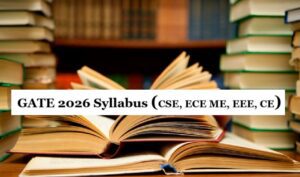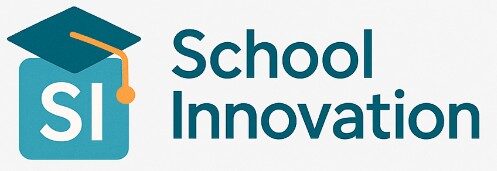The GATE 2026 Exam Pattern is very important for all students. This test is intended for people who wish to enrol in M.Tech programs, pursue higher education, or work at PSUs.. Before preparing, candidates must know the paper style. If you know the exam structure, you can study in the right way and save time.
This guide explains the GATE Exam Pattern 2026 in simple words. It covers all streams like Computer Science, ECE, Mechanical Engineering, and Life Science.
Basic Details of GATE Exam Pattern 2026
-
Mode: Computer-based test
-
Duration: 3 hours
-
Total Questions: 65
-
Total Marks: 100
-
Question Types: MCQ, MSQ, NAT
-
Sections: General Aptitude, Engineering Mathematics, Core Subject
-
Negative Marking: Only in MCQ
Why to Know the Exam Pattern
-
It helps to focus on important topics
-
It reduces exam fear
-
It saves time during preparation
-
It makes revision easier
Also Check – GATE 2026 Exam Date : Registration Date , Admit Card
Section-Wise Marks
| Section | Marks Range | Weightage |
|---|---|---|
| General Aptitude | 15 | 15% |
| Engineering Mathematics | 13–15 | 13–15% |
| Core Subject | 70–72 | 70% |
From this table, you can see the core subject carries the highest marks. Aptitude and mathematics are also scoring.
Question Types
-
MCQ (Multiple Choice Question) – one correct option, negative marks for wrong answers
-
MSQ (Multiple Select Question) – more than one correct option, no negative marks
-
Numerical Answer Type (NAT): type the response without any negative symbols.

GATE Exam Pattern for Computer Science
The GATE Exam Pattern for Computer Science has three parts.
-
General Aptitude: 15 marks
-
Engineering Mathematics: 13 marks
-
Core CSE: 72 marks
Important subjects:
-
Data Structures and Algorithms
-
Computer Networks
-
Operating Systems
-
Databases
-
Compiler Design
-
Theory of Computation
The GATE Exam Pattern for CSE tests coding, logic, and concept clarity.
GATE Exam Pattern for ECE
The GATE Exam Pattern for ECE focuses on circuits and signals.
-
General Aptitude: 15 marks
-
Engineering Mathematics: 13 marks
-
Core ECE: 72 marks
Key subjects:
-
Communication Systems
-
Signals and Systems
-
Analog Circuits
-
Digital Circuits
-
Control Systems
-
Microprocessors
GATE Exam Pattern for Mechanical Engineering
The GATE Exam Pattern for Mechanical Engineering has many formula-based questions.
-
General Aptitude: 15 marks
-
Engineering Mathematics: 15 marks
-
Mechanical Core: 70 marks
Main subjects:
-
Strength of Materials
-
Thermodynamics
-
Fluid Mechanics
-
Production Engineering
-
Theory of Machines
-
Design
This exam has more calculation questions, so practice is important.
Also Read – SSC CGL Admit Card 2025 Release Date, Download Link
GATE Exam Pattern 2026 for Life Science
The GATE Exam Pattern for Life Science is different.
-
General Aptitude: 15 marks
-
Chemistry: 25 marks
-
Optional subjects: 60 marks
Optional subjects include:
-
Biochemistry
-
Botany
-
Microbiology
-
Zoology
-
Food Technology
This paper gives a choice to select an optional subject.
Important Points for GATE Exam Pattern 2026
-
Total 65 questions in every paper
-
100 marks maximum
-
Virtual calculator is provided
-
No negative marks for MSQ and NAT
-
Time is 3 hours for all streams
-
You can move between sections anytime
How to Prepare According to the Exam Pattern
-
Start with General Aptitude – easy and common for all
-
Study Engineering Mathematics early – 13–15 marks are easy to score
-
Focus on Core Subject – 70% weightage decides rank
-
Practice NAT questions daily
-
Revise formulas and concepts regularly
-
Solve past year papers
Subject-Wise Quick Tips
-
CSE: Practice coding and logic daily
-
ECE: Revise circuits and signals with numericals
-
Mechanical: Focus on formulas and practice calculations
-
Life Science: Prepare theory well and select optional wisely
Check – SSC CHSL Exam Date 2025 : Notification, Admit Card
Marks Distribution Table : GATE 2026 Exam Pattern
| Stream | Aptitude | Math | Core Subject | Total Marks |
|---|---|---|---|---|
| Computer Science | 15 | 13 | 72 | 100 |
| ECE | 15 | 13 | 72 | 100 |
| Mechanical Engineering | 15 | 15 | 70 | 100 |
| Life Science | 15 | 25 | 60 | 100 |
GATE Syllabus 2026
Lakhs of students prepare for this exam to get admission into top IITs, NITs, and other universities for higher studies, or to secure jobs in Public Sector Undertakings (PSUs). To prepare well, the first step is to understand the GATE Syllabus properly.
This article explains the GATE syllabus in detail for major branches like Computer Science (CSE), Mechanical, Electronics and Communication (ECE), Electrical, and others. By knowing the syllabus, students can plan their studies, focus on important topics, and improve their chances of scoring good marks.
Why Understanding GATE Syllabus is Important?
Before starting preparation, candidates should clearly know what subjects and topics are included in the exam. The GATE Syllabus is the roadmap that helps students:
-
Identify the weightage of each subject.
-
Prepare a timetable according to strong and weak areas.
-
Avoid wasting time on unnecessary topics.
-
Practice questions that match the actual exam level.
Since the GATE exam is conducted for multiple streams, each paper has its own syllabus. However, some sections like General Aptitude and Engineering Mathematics are common for almost all streams.
Also Check – SSC CHSL Salary Per Month (After 5 Years) : In-Hand Salary
GATE Syllabus for CSE (Computer Science)
For students appearing in the computer science paper, the GATE syllabus of computer science is designed to test programming, algorithms, and system-level understanding. The main subjects are:
-
Digital Logic – Number systems, logic gates, Boolean algebra, combinational and sequential circuits.
-
Computer Organization and Architecture – Instruction sets, memory hierarchy, cache, pipelining.
-
Programming and Data Structures – C, C++, Java basics, linked lists, stacks, queues, trees, graphs.
-
Algorithms – Sorting, searching, dynamic programming, greedy algorithms.
-
Theory of Computation – regular expressions, grammar.
-
Compiler Design – Lexical analysis, syntax analysis, parsing.
-
Operating Systems – Processes, threads, scheduling, memory management, file systems.
-
Databases – SQL, normalization, ER model, indexing, transactions.
-
Computer Networks – TCP/IP, routing, LAN, WAN, data link protocols.
This GATE Syllabus for CSE focuses more on problem-solving, logical thinking, and practical understanding of computer systems.
GATE Syllabus Mechanical
The Mechanical Gate syllabus, It covers core mechanical subjects along with mathematics and aptitude. The main subjects are:
-
Engineering Mechanics – Statics, dynamics, equilibrium, friction.
-
Strength of Materials – Stress, strain, bending, shear force, torsion.
-
Theory of Machines – Kinematics, vibrations, mechanisms.
-
Thermodynamics – Laws of thermodynamics, cycles, entropy, work and heat transfer.
-
Fluid Mechanics – Properties of fluids, flow, pumps, turbines.
-
Heat Transfer – Conduction, convection, radiation.
-
Manufacturing Engineering – Casting, welding, machining, production.
-
Industrial Engineering – Operations research, quality management.
-
Design of Machine Elements – Springs, gears, bearings.
This GATE Syllabus Mechanical requires both numerical solving skills and theoretical clarity.

GATE Syllabus for ECE (Electronics and Communication)
Electronics and Communication is another major branch with high competition. The GATE syllabus for ECE covers both electronics and communication domains:
-
Networks – Resonance, Thevenin and Norton’s theorem, and circuit analysis.
-
Electronic Devices – Diodes, transistors, MOSFET, OPAMP.
-
Analog Circuits – Amplifiers, oscillators, feedback systems.
-
Digital Circuits – Logic gates, flip-flops, counters, multiplexer.
-
Signals and Systems – Fourier series, Laplace transform, convolution.
-
Control Systems – Feedback, stability, root locus, frequency response.
-
Communication Systems – Modulation, demodulation, probability, random variables, information theory.
-
Electromagnetics – Maxwell’s equations, wave propagation, antennas, transmission lines.
The gate syllabus electronics gives more weight to communication and signal processing topics.
Check this also – Top 10 Free Job Alert Websites You Can Trust in 2025
Electrical GATE Syllabus
The GATE syllabus for electrical engineering focuses on power systems, machines, and control concepts. The important subjects are:
-
Circuit Theory – Network equations, phasor diagrams, transient and steady-state analysis.
-
Electromagnetic Fields – Electric fields, magnetic fields, transmission lines.
-
Electrical Machines – Transformers, induction motors, synchronous machines, DC machines.
-
Power Systems – Power generation, distribution, fault analysis, stability.
-
Power Electronics – Converters, rectifiers, inverters, choppers.
-
Control Systems – Block diagrams, transfer functions, stability.
-
Signals and Systems – LTI systems, Fourier, Laplace, Z-transform.
-
Measurements – Instruments, accuracy, error analysis.
This electrical gate syllabus is practice-oriented and requires solving many numerical problems.
Common Sections in GATE Syllabus 2026
Apart from the core subjects of each branch, the following two sections are common in all GATE papers:
-
General Aptitude (15 Marks)
-
Verbal ability – English grammar, vocabulary, reading comprehension.
-
Numerical ability – Arithmetic, percentages, ratios, data interpretation, probability.
-
-
Engineering Mathematics (10–15 Marks)
-
Linear algebra, probability, statistics, calculus, differential equations, numerical methods.
-
Since these sections carry high marks, students should never ignore them during preparation.
GATE Syllabus – Subject Wise Marks Weightage
| Section/Subject | Approx. Weightage in Exam |
|---|---|
| General Aptitude | 15% |
| Engineering Mathematics | 10–15% |
| Core Subject Topics | 70–75% |
The exact distribution may change every year, but generally, core subjects carry the maximum marks.
How to Prepare for GATE Syllabus?
-
Go through the entire syllabus before starting.
-
Make short notes for every subject.
-
Practice previous year question papers.
-
Focus more on subjects with high weightage.
-
Revise regularly to retain formulas and concepts.
Also Read – SSC CGL Syllabus 2025 PDF Free Download, Exam Pattern

